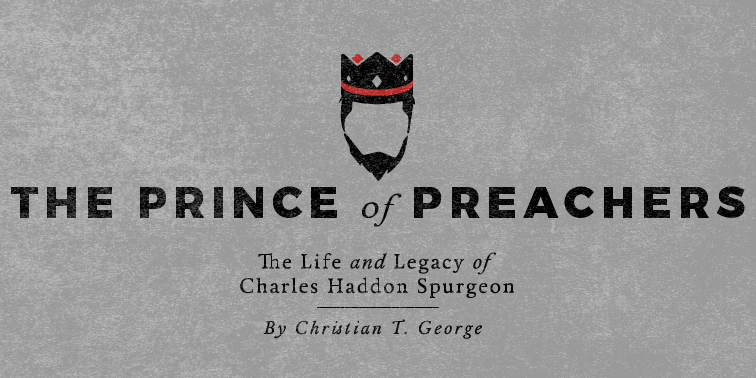
“The Prince of Preachers: The Life and Legacy of Charles Haddon Spurgeon” (Christian George)
In the new issue of Credo Magazine, “Preach the Word: Preachers Who Changed the World,” Christian George has contributed an articled titled, “The Prince of Preachers: The Life and Legacy of Charles Haddon Spurgeon.” Christian T. George received his Ph.D. from the University of St. Andrews, Scotland. He serves as Assistant Professor of Historical Theology and Curator of The Spurgeon Library at Midwestern Baptist Theological Seminary. He is currently working on The Lost Sermons of C.H. Spurgeon, a twelve-volume critical edition of Spurgeon’s earliest, unpublished Waterbeach sermons, slated for release next year by B&H Academic.
Here is the start of the article:
In the mid-1840s, Richard Knill, a well-known English evangelist, knelt beneath an arbor of trees in the little town of Stambourne to pray for the salvation of ten-year-old Charles Haddon Spurgeon. Spurgeon later recounted, “With many a story he preached Christ to me, and `told me how good God had been to him, and then he prayed that I might know the Lord and serve Him.” Three days later, Knill uttered a prophecy: “This child will one day preach the gospel, and he will preach it to great multitudes.”
Two decades later, that country boy became the most popular preacher in the Victorian world. His voice reached an estimated ten million people including politicians like U.S. President James Garfield, writers like Mark Twain, evangelists like D. L. Moody, missionaries like Hudson Taylor, and even artists like Vincent van Gogh who, decades before painting The Starry Night, listened to Spurgeon’s colorful and illustrative preaching.
By 1892, Spurgeon had published more words than could be found in the Encyclopedia Britannica. His church launched 66 parachurch ministries including two orphanages, a ministry to policemen, a book fund, a nursing home, and a clothing drive. His sermons were translated into 40 languages including Gaelic, Japanese, and Dutch. And his writings were found in the hands of Christians in China, soldiers in India, preachers in Tennessee, and sailors in San Francisco. In Colorado, coal miners surfaced during their breaks to read Spurgeon’s latest sermon. A prisoner from Brazil was last seen reading Spurgeon’s sermon minutes before his execution. An escaped convict from Australia was converted after reading the bloodstained sermon he looted from the body of his murdered victim.
Both great and small, rich and poor, princes and paupers found inspiration from Spurgeon’s writings – from the schoolboy in the United States who thought the answer to the question “Who is the Prime Minister of England?” was “Charles H. Spurgeon,” to David Livingstone, the courageous missionary to Africa who died with a yellowed sermon by Spurgeon in his hat. Richard Knill’s prophecy would indeed prove true. And before the century was over, God would use Spurgeon to revive the flames of evangelical fervor that had set England ablaze only a century prior. …
Read the rest of this article today!
Download as a PDF
Paul instructed Timothy to “preach the word; be ready in season and out of season; reprove, rebuke, and exhort, with complete patience and teaching. (2 Tim. 4:2). The command is a simple one. Yet, churches today and their pastors fail to take it seriously. Some churches are so used to being fed soundbites from the culture, that sitting down and listening to a sermon for thirty minutes seems not only old fashioned but ridiculously burdensome. Other churches do hear preaching but it is anything but the preaching of “the word.” Instead, the time is filled with one man’s own opinions. Entertaining or interesting as they may be, they are not God’s Word nor the exposition of it. Is it any wonder that churches are filled with malnourished Christians, believers who, whether they know it or not, are being fed milk instead of solid meat?
Needless to say, this is not what the apostle Paul envisioned. Paul taught Timothy that it is absolutely essential to the spiritual health of God’s people to hear the Word itself. By expositing the scriptures, the people hear what God himself has to say, and they walk away knowing who God is, what he has done, and how they are to live according to his will. In this issue of Credo Magazine we aim to help pastors and churchgoers alike recover a love for Bible-preaching. Several contemporary pastors explain what expositional preaching is, why it matters so much, and how churches today can recover the expository sermon in the pulpit. Other contributions take us back in time to those preachers God used in extraordinary ways. By looking to the ministries of men like Spurgeon, Augustine, Edwards, Lloyd-Jones, and others, we desire to see their preaching influence our own. Imitation is not the goal; we rather crave their commitment to expounding the scriptures and pray God’s people would as well.
Contributors include Christian T. George, David P. Barshinger, Jason Helopoulos, Christopher Catherwood, Adrian Reynolds, Adrian Reynolds, Michael A.G. Haykin, Jonathan Worsley, Murray Capill, Deven MacDonald, and others.
Matthew Barrett, Executive Editor






